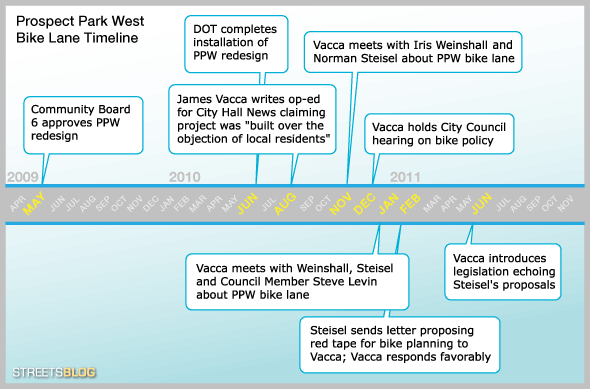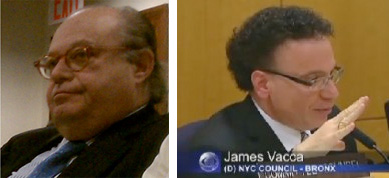Editor’s note: With yesterday’s appellate ruling prolonging the Prospect Park West case, Streetsblog is running a refresher on the how the well-connected gang of bike lane opponents waged their assault against a popular and effective street safety project. This is the fourth installment from the six-part NBBL Files.
This piece originally ran on October 11, 2011.
This is the fourth post in a series examining the tactics employed by opponents of the Prospect Park West redesign. Read the first, second, and third installments.
The primary objective of most members of "Neighbors for Better Bike Lanes" was clearly to remove the bike lane from Prospect Park West. They didn't particularly care about bike lanes elsewhere, though they privately cheered every defeat of a sustainable transportation project as a sign that they might wipe out the bike lane in front of their homes. But because the NBBL strategy relied so heavily on impeding NYC DOT bike planning and tarnishing the reputation of transportation commissioner Janette Sadik-Khan, their parochial crusade ended up empowering opponents of street safety across the city.
Nowhere is NBBL's citywide influence more apparent than in the receptive audience they found with City Council Transportation Committee Chair James Vacca. As we reported earlier this year, NBBL leaders including former transportation commissioner Iris Weinshall met with Vacca in the run-up to his December, 2010 hearing on bike policy -- a harbinger of the bikelash that peaked later that winter. Communications obtained by Streetsblog indicate that NBBL not only influenced Vacca's oversight hearings, they also managed to insert their ideas into his legislation.
Messages from bike lane opponent Norman Steisel reveal a close link between his crusade to thwart bike projects with red tape and two bills introduced in the City Council this June by Vacca.
In mid-February, Steisel, a former sanitation commissioner and first deputy mayor under David Dinkins, wrote a lengthy letter to Vacca and City Council Member James Oddo on the topic of bike planning. The letter was triggered by Oddo's proposal to subject all bike lanes to environmental review, a suggestion that environmental law experts called a waste of taxpayer money. Some of Steisel's suggestions ended up in two bills Vacca introduced this summer, which are still under consideration in his committee.
"Iris and Norman have been meeting with City Council people privately, particularly Jimmy Vacca who doesn't like the lanes."
- PPW bike lane opponent Louise Hainline, December 2010
In the February letter, Steisel put forward a number of recommendations to impede the city's bike planning process, many of which were gleaned from his personal campaign to remove the Prospect Park West bike lane. For instance, Steisel wrote that bike lanes should be planned with the "historic character" of the surrounding neighborhood in mind (the appearance of the bike lane on PPW chafed at NBBL members' aesthetic sensibilities). At the same time, he argued that the traffic-calming effect of bike lanes should not be taken into consideration (it irked bike lane opponents to hear that the PPW redesign was implemented to reduce speeding).
Steisel's knowledge of New York City government runs deep, and his letter reads like the wish list of someone who wants to see bike projects mired in bureaucracy for years.
"I propose that the City Council enact legislation that would require the development of an updated citywide master plan for bike paths," Steisel wrote. Later, he elaborated that "an effective citywide planning process must involve, in addition to NYC DOT, the Community Boards, the Borough Boards (and Borough Presidents), the City Council, and the Department of City Planning and Planning Commission… In addition, other governmental agencies (among them, Police, Fire/EMS, Sanitation, Education, Health and Hospitals, Parks, Economic Development, Landmarks, and the Art Commission) should participate."
Many of the agencies Steisel listed, including NYPD and FDNY, are already consulted on individual bike projects and other DOT safety improvements that alter the geometry of a street. But his proposals would have shackled bike planning to complex, politically-fraught procedures and drowned the process in an alphabet soup of additional city departments. Steisel believed that several agencies he wanted to draw into bike planning decisions -- including the Landmarks Preservation Commission, the City Planning Commission and the Art Commission (now the Public Design Commission) -- were "kindred spirits" of the bike lane opponents in NBBL.
After sending Vacca his letter, Steisel wrote to Weinshall -- bike lane opponent, former DOT Commissioner and wife of Senator Chuck Schumer -- telling her that Vacca was interested in his ideas. "Vacca implied he'd like to discuss," wrote Steisel.
Steisel's ideas surfaced in two Vacca bills introduced on June 29. The first requires the city to update the bicycle master plan every five years and compels DOT, before finalizing that plan, to consult with NYPD, FDNY, the Department of Small Business Services, the Mayor's Office for Persons with Disabilities, community boards, borough presidents and council members. The bill also requires the bike master plan to quantify how many motor vehicle lanes and parking spaces would be removed under the plan, a level of specificity poorly suited to master planning but well-calibrated to stir up opposition.
The second bill requires DOT to consult with the same list of agencies whenever it undertakes a "major transportation project," defined as one that adds or removes parking or motor vehicle lanes over more than a few blocks.
Vacca's bills contain some remarkable similarities to Steisel's proposals, though the legislation differs in significant ways from the procedural barriers imagined by the former deputy mayor. The two bills don't touch on environmental review, as Steisel suggested, and they are more concerned with parking, a Vacca obsession. Jeff Lynch, Vacca's chief of staff, told Streetsblog over email that Steisel "had no role in either bill."
But it is clear that Vacca took Steisel and Weinshall seriously. Fellow NBBL leader Louise Hainline wrote in December 2010 that the transportation committee chair was especially receptive to their entreaties: "Iris and Norman have been meeting with City Council people privately, particularly Jimmy Vacca who doesn't like the lanes." Both Steisel and Weinshall were in frequent contact with Vacca before the February letter was sent, communicating by phone and email in the days before Vacca's December bike hearing. The two bike lane opponents also sat down face-to-face with Vacca at least twice -- once before the hearing and once in January 2011, at a meeting attended by City Council Member Steve Levin. And when Streetsblog asked Vacca's office how he could justify the red tape in the master planning bill, his staff cited the PPW bike lane as a project that would have benefited from the extra bureaucracy.
The appearance of these two bills a few months after Steisel sent his letter shows NBBL's ability to inject ideas into the legislative agenda of Vacca's committee.







